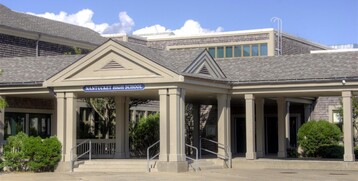Some Teachers Fault School Administration, Not Housing, For Ongoing Staffing Issues
JohnCarl McGrady •

As the Nantucket Public School (NPS) system nears the first day of school with six teaching positions still empty and several longtime educators having decided to leave their jobs, some teachers are calling the situation a crisis - and one that isn’t necessarily driven by the island’s lack of affordable housing.
The school administration and School Committee have downplayed those concerns. But after the stress and behavioral fallout of the COVID-19 pandemic, and a contentious and protracted negotiation over a new contract, there seems to be a growing disconnect between teachers and administration in Nantucket’s public schools.
Several veteran teachers who spoke to the Current have suggested that housing, long deemed the primary cause of the teacher shortage, is just one factor among many. Those teachers point to flaws in the NPS administration, which was largely overhauled three years ago, including insufficient and uneven discipline for students, poor communication, and a general disregard for the opinions of teachers. The administration denies those accusations.

“I think housing is definitely a reason why it’s hard to get teachers but I don’t think its a reason we’re losing the ones we already have,” said 19-year Nantucket High School (NHS) English teacher Stacey Edzwald, who took a pay cut to teach at the Nantucket New School next year. “Everyone who left [NHS] this year had housing.”
“The general chaos, lack of follow-through on student issues and discipline, the perpetual bathroom destruction—that’s just the tip of the iceberg,” said former NHS science teacher Ashley Erisman, who also left her position this year.
School Committee Chair Pauline Proch agrees that finding teachers is a problem. “Having gone through last year with a lot of open positions, to be honest…I can’t imagine we will be able to open up the first day with every position filled,” she said.
But Proch doesn’t believe the administration is to blame.

“I have no concerns at all. I think we have excellent administration,” she said. “As far as I know, there is nothing we have been alarmed about. People leave jobs all the time.”
Matt West, an NHS history teacher entering his third year at the school, agreed. “You’re going to hear a lot of people grumble about internal issues,” he said, “but at the bottom line, that’s not the problem.”
Superintendent Beth Hallett doesn’t think NPS will start the year with a significant teacher shortage.
“We are in a good place as we are nearly fully staffed,” she said. “We are currently advertising for six positions, but some of these positions are supplementary; we can manage with appropriate class sizes and teacher schedules when 1.5 of these positions are filled. I am confident that we will be able to find a solution by the time school starts.”
NPS has faced a rash of misbehavior from students in recent years, and nearly every teacher interviewed for this article felt that one of the primary causes of the misbehavior was what they described as the administration’s consistently inadequate response.

“We don’t have behavior policies that we follow at the high school. We have a student handbook, but we just don’t follow it…students either aren’t being held accountable for bad behavior or they’re being held accountable arbitrarily,” said long-time NHS math teacher Jedidiyah Williams, who is leaving for Belmont High School. “The consequence is students are going to act out.”
Williams said there used to be a system where teachers would report misbehavior using slips of paper, but that system was removed when the new administration took over, leaving teachers with no formal way to report students.
“I have brought this up and many other [teachers] have brought this up in meeting after meeting for three years now,” Williams said. “I’ve just lost faith that anything is going to be done about it.”
“According to our records, slips have not been used for several years due to the issue of student privacy,” Hallett said. “Currently, teachers are requested to call to report that a student is being sent to the office from class and then follow up with an email so that there is specific, private information about the infraction.”
Williams alleges this has led to uneven enforcement and that complaints are sometimes not followed up on.
Proch gave an alternative reason for increased student misbehavior: a combination of the COVID-19 pandemic, housing insecurity, food insecurity, and the rise of social media.
Hallett also noted that student misbehavior is up across the country.

“Nantucket is not unique in this situation; my colleagues across the state are sharing that poor student behavior is at an all-time high, and some resignations are as a result of that,” she said.
Hallett is optimistic that new professional development for teachers, emphasizing restorative justice, will help to solve the problem.
The most high-profile example of student misbehavior at NPS in recent years has been the repeated bathroom vandalism that has cost the school over $100,000. Multiple teachers mentioned the vandalism and the administration’s response to it as a reason they chose to leave the school system.
“There have been students caught messing with the bathrooms, and they didn’t face any consequences,” Williams said, an allegation that was disputed by the school administration.
“It is not true that students have not been disciplined for infractions such as vandalism,” Hallett said. “Those students who were caught vandalizing bathrooms or other school property were given appropriate consequences, including suspension days and community service with the custodial staff.”
If so, Williams wasn’t told—part of what some teachers say is a broader pattern of poor communication. Teachers described receiving notice of mandatory meetings one minute in advance, not being told when grades were due, and having students pulled from their classes with no warning.
“The atmosphere at our school often feels chaotic and unpredictable. We are never quite sure what to expect from day to day,” NHS history teacher Steve Laredo said.
“Despite voicing concerns, the teachers really have not been heard,” Erisman said.
Laredo pointed to several administrative failures he believes are contributing to the staff shortage and the recent departures of some longtime educators.

“This has risen to a crisis level due in large part to the fact that the system does not act as if its staff are a valuable resource, or that we are in short supply,” he said. “Veteran staff have been refused unpaid leaves-of-absence. They have had to fight for full paid maternity leave. They have had to fight with admin to be fairly paid when taking on extra classes to cover staffing holes. They have been routinely ignored when raising concerns about major changes in curriculum and programming. They have seen little to no action taken after repeatedly raising concerns about student behavior, issues with the facilities, and issues relating to school schedules and extracurriculars.”
Housing is undeniably still an issue, however—and every teacher interviewed for this article felt the administration should be doing more to address it.

“I don’t think the school is working enough with the town to develop housing projects, to build low-income housing,” West said. “How am I going to feel secure in having my kids out here if I'm not sure I will have housing?”
“It just seems so insurmountable,” Cyrus Peirce Middle School counselor Pam Pellegrino said. “To not be able to buy something is really tough.”
Proch disagreed. “I don’t think the schools could be doing very much more than they already are,” she said.
The administration, Proch continued, has worked hard all summer to find housing for teachers, at times putting other important work on hold to speak with landlords and secure rooms.
“We do EVERYTHING we can,” Hallett said in an e-mail. “[The] Central Office keeps a running list of potential housing offers for teachers and those teachers searching for housing…principals and administrators spread the word on social media in search of options for new teachers. We also have recently forged partnerships with different island organizations to find additional housing solutions.”
West pushed back against the idea that administrative failures are a major factor in the shortage. “It all comes back down to housing,” he said. “If housing weren’t an issue you would be able to get so many teachers to move out here and build their career.”
“I hear weekly that somebody has accepted the job and then housing didn’t pan out and they had to step away,” Proch said. “We find people who want to come here, qualified candidates, and then the housing falls through.”
Yet even as teachers struggled to find housing, the school opted to invest a large amount of money into new athletic facilities, a decision some faculty members found confusing.
“My coworker and I were talking as they were building another tennis court,” Pellegrino said. “Like, wow. When we’re all struggling to find homes and housing, that didn’t feel so great.”
“It definitely hurt when they were pitching the new athletic complex,” Edzwald added.
The administration claims upgrading the athletic complex is an important step in improving NPS facilities and was listed as a priority a decade ago before the teacher shortage began.
“Improving our athletic complex is a phase in the Campus Wide Master Plan developed almost 10 years ago and much needed,” Hallett said. “Based on community feedback, we have shifted our focus to the needs of our buildings.”
Regardless of the reasons for the vacancies, NPS will likely enter the school year understaffed yet again, even if the most critical 1.5 positions are filled.